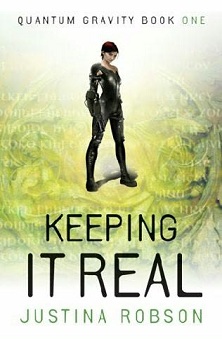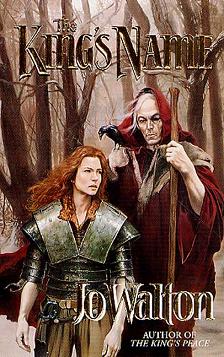Last year I set myself the task to read at least twelve science fiction or fantasy books by women, making a list of what I was going to read, based on what I had already on my bookshelves. Having written my review of The King’s Peace yesterday, I’ve reached my goal. I’m not going to do the same this year, but I will keep a check on how many science fiction or fantasy books by women I’m reading. At the start I was a bit apprehensive about how difficult this would be, but in the end it turned out to be relatively easy to keep to my goal, with only an occasional hiccup.
The list:
January: The Left Hand of Darkness — Ursula LeGuin
This is not a feminist science fiction novel. It’s a novel about gender and gender expectations and the role our assumptions of having two separate sexes each with their own character, strength and weakness play in our societies, but it’s not feminist, unless every book about gender is by definition feminist.
February: Bold as Love — Gwyneth Jones
At first glance Bold as Love looked like a late and out of date example of New Wave nihilism, but thinking about it when reading it I realised that instead it mirrors the anxieties of late nineties Britain, when the optimism of early New Labour had long since vanished, the country resigned to being rundown and slightly shit, but still with a bit of the glamour of Cool Britannia left, that idea that rock bands could influence politics by rubbing shoulders with the politicians.
March: The Female Man — Joanna Russ
The Female Man is a tough book, but not a hard book to read. Joanna Russ is a brilliant writer and everything in here sparkles; at times you can only sit there open mouthed with awe. It’s a tough book because of the raw anger Russ has put in it.
April: China Mountain Zhang — Maureen McHugh
China Mountain Zhang is not just a good first novel, it’s a good novel period. What strikes me most looking back on it is the sheer ambition of Maureen McHugh to write such a kitchen sink, slice of life story in a genre not know for its patience with that sort of thing.
May: Foreigner — C. J. Cherryh
Yet, once you’ve read a few of her novels, you discover that there is one narrative trick all her stories have in common, no matter what the setting or the plot is. What she likes to do is to take her protagonists out of their comfort zone, get them at their most vulnerable and then put the pressure on.
June: The Halfling and Other Stories — Leigh Brackett
As a genre planetary romance has always been a bit dodgy, an evolutionary offshoot of the Africa adventure story, with a lot of the same racist and colonial assumptions build in. So you have cringing Gandymedian natives, mysterious jungles and alien drums, crazed halfbreeds and all those other tropes recycled from Tarzan.
July: A Point of Honor — Dorothy J. Heydt
A Point of Honor is an enjoyable, light adventure science fiction story that sadly did not get the readership it deserved,
August: Golden Witchbreed — Mary Gentle
It was the beautiful Rowena cover that got my attention, a long long time ago when I was browsing the English shelves at my hometown’s library. Showing a blonde woman in jeans and fur cape, armed with a stave and linking fingers with an obviously alien six fingered man, two swords at his side. That intriqued me, it promised both adventure and romance and it got me to pick up the book and that was how I got to know Mary Gentle.
September: 10,000 Light Years from Home — James Tiptree, Jr
10,000 Light Years from Home starts on a high note, with a classic Tiptree story that embodies everything that you should associate with Tiptree. It takes something that lies at the heart of science fiction as a genre, a worldview and turns it on its head, not to mention reveals the sexual undercurrent running through it.
October: Trouble and Her Friends — Melissa Scott
What Trouble and Her Friends does that few other cyberpunk novels do is to look at the internal politics of that hacking underground itself. And by doing so Melissa Scott is the only cyberpunk author that actually understood and anticipated the dynamics of online groups, of how even in groups that define themselves as outsiders there can be people who are outside the group as well, because for one reason or another they are different from the dominating members of a given group. Not a new dynamic of course, as any veteran of a socialist or anarchist splinter group can confirm. Even in progressive groups race, gender and sexuality play a role, but most cyberpunk authors assumed that in the bodiless worlds of cyberspace these things would no longer matter. Melissa Scott was clever enough to know that this is naive at best.
November: No Present Like Time — Steph Swainston
What also helps to set the Fourlands apart is that while like in other series the technology and society is vaguely European and Medievaloid, it also has cigarettes, newspapers, t-shirts and professional football matches: it’s clearly not our Middle Ages. Swainston never tries to explain these incongruities; it’s just the way the Fourlands are and it works. In some ways her world building reminds me of China Miéville’s, only less gorey and incessantly baroque, though she comes close in the scenes set in the Shift, another element never fully explained or even understood by Jant, part hallucination but very real in its own terms.
December: The King’s Peace — Jo Walton
As anybody who has actually been reading my booklog over the past few years knows, I’ve been reading a lot about the fall of the Roman Empire and the transformation of Late antiquity into the Early Middle Ages and about whether the Roman world really fell or was just transformed and how that would’ve looked like to the people living through it. The King’s Peace may be set in a disguised, fantasy version of this part of history, but I think it got it as well as anybody could’ve gotten it. The world changes, but change does not have to be bad and although what was lost could not be recaptured, what was built in its stead is good in its own right. A very complex, bittersweet and mature attitude for a fantasy novel to take.

